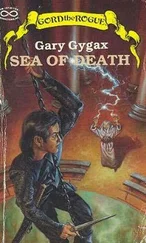Up above, Mamdoo-tindal's knuckles had turned white on the yard.
Did you see that? he said to Jodu. Did you see?
What?
That cat jumped ship: now there's a sign if ever I saw one.
*
The last woman to come on board was Deeti, and she was climbing up the side-ladder when the cat leapt across her path. She would gladly have fallen in the water rather than be the first to cross the line of its flight, but Kalua was right behind her, holding her steady. At his back there were so many others, crowding on to the ladder, that there was no resisting their collective weight. Driven on by the maistries, the migrants surged forward and Deeti was carried across the invisible mark, to be deposited on the schooner's deck.
Through the veil of her sari, Deeti looked up at the masts, towering above. The sight made her a little giddy, so she kept her head bent and her eyes lowered. A number of maistries and silahdars were positioned along the deck, ushering the migrants along with their lathis, shoving them in the direction of the booby-hatch. Chal! Chal! Despite their shouts, progress was slow because of all the clutter on deck; everywhere you looked there were ropes, casks, pipas, bimbas, and even the occasional runaway chicken and bleating goat.
Deeti was almost abreast of the foremast when she became aware of a voice that sounded strangely familiar: it was shouting obscenities in Bhojpuri: Toré mái ké bur chodo!
Looking ahead, through a tangle of ropes and spars, she caught sight of a bull-necked, heavy-bellied man with luxuriant white moustaches; her feet froze and a cold hand took hold of her heart. Even though she knew who it was, there was a voice in her ear telling her that it was not a mortal man at all, but Saturn himself: It's him, Shani, he's been hunting you all your life and now he has you in his grasp. Her knees buckled under her, sending her crashing to the planks, at her husband's feet.
By this time a great press of people had poured on to the deck, and they were being herded steadily aft by the guards and overseers, with their swishing lathis. Had the person behind Deeti been someone of lesser size and strength than Kalua, she might well have been trampled where she lay. But on seeing her fall, Kalua braced himself against the deck and was able to bring the flow of people to a sudden halt.
What's happening there?
The disturbance had caught Bhyro Singh's attention and he began to advance upon Kalua, lathi in hand. Deeti lay where she was and pulled her sari tight over her face: but what was the point of hiding when Kalua was standing right above her, in full view and sure to be recognized? She shut her eyes and began to mutter prayers: Hé Rám, hé Rám.. .
But the next thing she heard was Bhyro Singh's voice, saying to Kalua: What's your name?
Was it possible that the subedar would not recognize Kalua? Yes, of course: he had been away from the village these many years and had probably never seen him, except as a child – and what interest would he have had in a leather-tanner's child anyway? But the name, Kalua – that he was sure to know because of the scandal of Deeti's escape from her husband's funeral pyre. Oh, fortunate the kismat that had prompted her to be careful with their real names; if only Kalua did not mention it now. To give him warning, she dug a fingernail into his toe: Beware! Beware!
What's your name? the subedar asked again.
Her prayer was answered. After a moment's hesitation, Kalua said: Malik, my name is Madhu.
And is that your wife, lying there?
Yes, malik.
Pick her up, said Bhyro Singh, and carry her to the dabusa. Don't let me see either of you making trouble again.
Yes, malik.
Kalua slung Deeti across his shoulder and carried her down the ladder, leaving their bundles on deck. After he had laid her on a mat, he would have gone back to fetch the bundles, but Deeti would not let him: No, listen to me first: do you know who that man was? He's Bhyro Singh, my husband's uncle; it's he who arranged my marriage, and it's he who sent people out to look for us. If he knows we're here…
*
'Are you ready, ho?' The pilot's call was answered promptly by Serang Ali: Sab taiyár, sáhib .
The sun was at its zenith now, and the booby-hatch that led to the dabusa had long since been battened down. Along with every other lascar, Jodu had been set to work on clearing the main deck – stowing pipas of drinking water, tirkaoing hamars, and hauling zanjirs through the hansil-holes. Now, with the chickens and goats safely stowed in the ship's boats, nothing else remained to be cleared and Jodu was impatient to be up on the trikat-yard again, for it was from aloft that he envisioned himself taking a last look at his native city: his were the first hands on the iskat when at last the command came – 'Foretopmen aloft!' – Trikatwalé úpar chal!
From Calcutta to Diamond Harbour, some twenty miles to the south, the Ibis was to be towed by the Forbes , one of several steam-tugs that had recently been put into commission on the Hooghly River. Jodu had seen these diminutive boats from afar, puffing consequentially along the river, towing mighty barques and brigantines as if they weighed no more than his own frail dinghy: not the least part of his eagerness to be under way lay in the prospect of a tow from one of these amazing vessels. Looking upriver, he saw that the round-nosed tug was already approaching, tolling its bell to clear a path through the traffic on the river.
On the far bank lay the Botanical Gardens and Jodu's perch was high enough that he could see the familiar trees and pathways. The sight made him think, for one fleeting and wistful instant, of what it would have been like to have Putli balancing on the trikat-yard beside him: that it would be sport, there was no denying, and she could have done it too, had it been possible. Of course, such a thing could not be permitted under any circumstances – but still, he couldn't help wishing that he had parted from her on some better, less contentious note: there was no telling when, if ever, he would see her again.
His attention had strayed so far that he was taken by surprise when Sunker said: Look, over there…
The heads of a pair of divers could be seen bobbing around the anchor buoys as they loosed the schooner's cables. It was almost time now: in a matter of moments they would be pulling away. Mamdoo-tindal tossed back his hair, and closed his long-lashed eyes. Then his lips began to move in prayer, murmuring the first words of the Fatiha. Jodu and Sunker were quick to join in: B'ism'illáh ar-rahmán ar-rahím, hamdu'l'illáh al-rabb al-'alamín … In the name of God, the Compassionate, the Merciful, Praise to the Lord of all Creation…
*
'All hands to quarters, ahoy!' The pilot's shout was followed by a cry from the serang: Sab ádmi apna jagah!
As the tug drew closer, the hammering of its engine grew louder and louder, and in the enclosed, airless gloom of the dabusa, it sounded as if some enraged demon were trying to rip apart the wooden planks of the hull in order to devour the people who sat huddled within. It was very dark inside, for the maistries had extinguished the candles and lamps on their way out: there was no need for them, they'd said, now that the migrants were all nicely packed in – to keep them burning would only increase the risk of fire. No one had disputed this but everyone understood that the overseers were merely saving themselves an extra expense. With no flame lit and the hatch secured, such light as there was came from cracks in the timber and the openings of the piss-dales. The leaden gloom, combined with the midday heat and the fetid stench of hundreds of enclosed bodies, gave the unstirred air a weight like that of sewage: it took an effort even to draw breath.
Читать дальше












